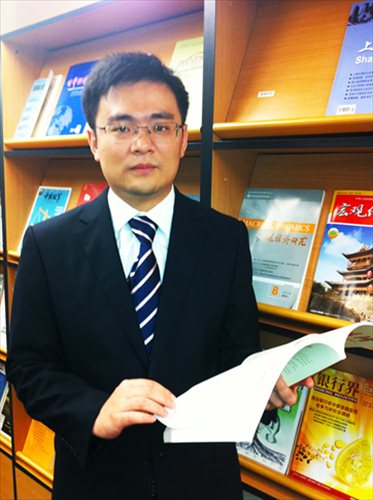HOME >> BUSINESS
Experts see industrial restructuring, IPO reform, real estate market on agenda
Source:Global Times Published: 2016-3-2 20:53:01
Editor's Note: China's annual meetings of the National Committee of the Chinese People's Political Consultative Conference (CPPCC), a top advisory body to the government, and the National People's Congress (NPC), China's legislature, begin on Thursday and Saturday, respectively. The Government Work Report, which outlines major economic targets for China, is set to be released and discussed during the two sessions. In the run-up to the meetings, the Global Times interviewed several experts to find out what issues will be highlighted in the report and which issues policy-makers will focus on during the two sessions.
"Some proposals are expected to focus on supply-side reform, with the goal of generating sustainable growth."
Xu Hongcai, director of the economic research department at the China Center for International Economic Exchanges

The government will pursue a GDP target in a range of 6.5 and 7 percent, which is a "reasonable" range considering the ups and downs of China's economy, Xu told the Global Times on Tuesday.
The central government set the range to reflect the fact that economic growth has downshifted from high-speed to medium-to-high speed, with the aim of achieving the goals of the 13th Five-Year Plan (2015-20), Xu said.
"Some proposals are expected to focus on supply-side reform, with the goal of generating sustainable growth," he said.
For example, policymakers will focus on ways to increase productivity, Xu said, which dovetails with the central government's plan for industrial restructuring.
The purpose of industrial restructuring is to push companies up the value chain to become more competitive in the global market, Xu said. The issue will also be discussed at the meetings.
The country's economy has been gradually become more consumer-driven in recent years.
Consumption accounted for 66.4 percent of GDP growth in 2015, up about 15.4 percentage points from 2014, according to the National Bureau of Statistics (NBS). However, Xu said that quality investments "are also needed."
He noted that they will help drive China's supply-side reforms, which aim to boost productivity by reducing ineffective and low-end supply in favor of effective and medium-to-high-end supply.
"Investment in sectors such as high-tech, high-end manufacturing and healthcare will continue to receive attention," he said, noting that infrastructure investment, a pillar of local economic growth, will also be addressed at the meetings.
Considering China's recent sluggish trade data, some proposals will also seek to help companies lower costs by reducing logistics fees and simplifying custom procedures, Xu noted.
China's import and export volume fell 7 percent in 2015 due to continuing downward pressure on global economy, according to media reports.
"There needs to be more targeted monetary measures this year to ensure liquidity is channeled to the real economy."
Liu Xuezhi, senior analyst at Bank of Communications

In 2016, the government is expected to retain a proactive fiscal policy and prudent monetary policy to fuel economic growth, said Liu.
On Monday, the People's Bank of China, the central bank, announced a 0.5 percentage point cut to the reserve requirement ratio (RRR) for commercial banks.
Liu noted that the monetary policy is expected to be more accommodative in 2016, as major economic indicators still point to persistent downward pressure.
"There needs to be more targeted monetary measures this year to ensure the liquidity is channeled to the real economy," he said.
Liu also suggested that policymakers may set a larger fiscal deficit target in this year's government work report to fund investment, a key driver for growth.
This year's fiscal-deficit-to-GDP ratio could range between 2.7 percent and 3 percent, up from 2.3 percent in 2015, Liu said.
"It might also encourage banks set mortgage rates at reasonable levels and speed up how long it takes banks to grant mortgages."
Yan Yuejin, analyst with E-house China R&D Institute
In recent years, more and more Chinese Internet users have been keeping a close eye on home prices, which soared in the weeks following this year's Spring Festival holidays.
The housing market recovery will also be a major concern for the two sessions' representatives, Yan told the Global Times on Tuesday.
Home prices in half of China's 70 large and mid-sized cities, especially first-tier cities, grew on a month-on-month basis in this January, according to NBS.
Meanwhile, the gap in home prices among cities has been expanding.
"People are likely to see more favorable home buying policies," Yan said, noting that once home prices rise sharply, regulations ought to be implemented to curtail speculation.
During the two sessions, policymakers are likely to again address the industry, considering it is a main driver of economic growth.
"A bear market offers a great window to push forward IPO reform, which may even stop the downward trend in the stock markets by easing investors' concerns."
Dong Dengxin, director of the Finance and Securities Institute at Wuhan University of Science and Technology

The launch of the registration-based IPO system is a reform that cannot be avoided, said Dong.
He said that the authorities should provide a timetable for the launch of the new system during the two sessions, which could help boost market sentiment.
Since the beginning of the year, the benchmark index has tumbled around 20 percent, the threshold of a bear market.
"A bear market offers a great window to push forward IPO reform, which may even stop the downward trend in the markets by easing investors' concerns," Dong noted.
The 2015 Government Work Report made it clear that China would pursue a registration-based IPO system, which is supposed to be more market-oriented and provide a streamlined IPO process.
In December 2015, the country's top legislature authorized the State Council to implement the new IPO system as early as March.
But this year's turmoil in the stock markets has sparked fears that the new system, which is supposed to increase new issuances, could boost volatility.
The situation has led to speculation that the government will delay rolling out the new system. Dong believes this is a misunderstanding. "The registration-based system will benefit the stock markets in the long run because it is more market-oriented and offers more investment options for investors," he said.
Newspaper headline: China’s economy takes center stage
"Some proposals are expected to focus on supply-side reform, with the goal of generating sustainable growth."
Xu Hongcai, director of the economic research department at the China Center for International Economic Exchanges

The government will pursue a GDP target in a range of 6.5 and 7 percent, which is a "reasonable" range considering the ups and downs of China's economy, Xu told the Global Times on Tuesday.
The central government set the range to reflect the fact that economic growth has downshifted from high-speed to medium-to-high speed, with the aim of achieving the goals of the 13th Five-Year Plan (2015-20), Xu said.
"Some proposals are expected to focus on supply-side reform, with the goal of generating sustainable growth," he said.
For example, policymakers will focus on ways to increase productivity, Xu said, which dovetails with the central government's plan for industrial restructuring.
The purpose of industrial restructuring is to push companies up the value chain to become more competitive in the global market, Xu said. The issue will also be discussed at the meetings.
The country's economy has been gradually become more consumer-driven in recent years.
Consumption accounted for 66.4 percent of GDP growth in 2015, up about 15.4 percentage points from 2014, according to the National Bureau of Statistics (NBS). However, Xu said that quality investments "are also needed."
He noted that they will help drive China's supply-side reforms, which aim to boost productivity by reducing ineffective and low-end supply in favor of effective and medium-to-high-end supply.
"Investment in sectors such as high-tech, high-end manufacturing and healthcare will continue to receive attention," he said, noting that infrastructure investment, a pillar of local economic growth, will also be addressed at the meetings.
Considering China's recent sluggish trade data, some proposals will also seek to help companies lower costs by reducing logistics fees and simplifying custom procedures, Xu noted.
China's import and export volume fell 7 percent in 2015 due to continuing downward pressure on global economy, according to media reports.
"There needs to be more targeted monetary measures this year to ensure liquidity is channeled to the real economy."
Liu Xuezhi, senior analyst at Bank of Communications

In 2016, the government is expected to retain a proactive fiscal policy and prudent monetary policy to fuel economic growth, said Liu.
On Monday, the People's Bank of China, the central bank, announced a 0.5 percentage point cut to the reserve requirement ratio (RRR) for commercial banks.
Liu noted that the monetary policy is expected to be more accommodative in 2016, as major economic indicators still point to persistent downward pressure.
"There needs to be more targeted monetary measures this year to ensure the liquidity is channeled to the real economy," he said.
Liu also suggested that policymakers may set a larger fiscal deficit target in this year's government work report to fund investment, a key driver for growth.
This year's fiscal-deficit-to-GDP ratio could range between 2.7 percent and 3 percent, up from 2.3 percent in 2015, Liu said.
"It might also encourage banks set mortgage rates at reasonable levels and speed up how long it takes banks to grant mortgages."
Yan Yuejin, analyst with E-house China R&D Institute

In recent years, more and more Chinese Internet users have been keeping a close eye on home prices, which soared in the weeks following this year's Spring Festival holidays.
The housing market recovery will also be a major concern for the two sessions' representatives, Yan told the Global Times on Tuesday.
Home prices in half of China's 70 large and mid-sized cities, especially first-tier cities, grew on a month-on-month basis in this January, according to NBS.
Meanwhile, the gap in home prices among cities has been expanding.
"People are likely to see more favorable home buying policies," Yan said, noting that once home prices rise sharply, regulations ought to be implemented to curtail speculation.
During the two sessions, policymakers are likely to again address the industry, considering it is a main driver of economic growth.
"A bear market offers a great window to push forward IPO reform, which may even stop the downward trend in the stock markets by easing investors' concerns."
Dong Dengxin, director of the Finance and Securities Institute at Wuhan University of Science and Technology

The launch of the registration-based IPO system is a reform that cannot be avoided, said Dong.
He said that the authorities should provide a timetable for the launch of the new system during the two sessions, which could help boost market sentiment.
Since the beginning of the year, the benchmark index has tumbled around 20 percent, the threshold of a bear market.
"A bear market offers a great window to push forward IPO reform, which may even stop the downward trend in the markets by easing investors' concerns," Dong noted.
The 2015 Government Work Report made it clear that China would pursue a registration-based IPO system, which is supposed to be more market-oriented and provide a streamlined IPO process.
In December 2015, the country's top legislature authorized the State Council to implement the new IPO system as early as March.
But this year's turmoil in the stock markets has sparked fears that the new system, which is supposed to increase new issuances, could boost volatility.
The situation has led to speculation that the government will delay rolling out the new system. Dong believes this is a misunderstanding. "The registration-based system will benefit the stock markets in the long run because it is more market-oriented and offers more investment options for investors," he said.
Newspaper headline: China’s economy takes center stage
Posted in: Insight